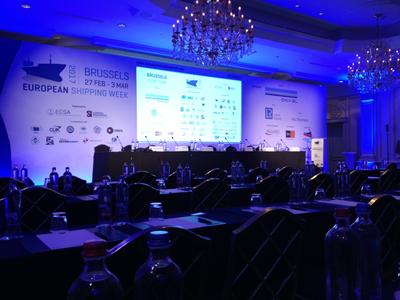Choppy seas ahead: Risks and opportunities for the European Shipping Industry

SMMI attended the flagship conference of the European Shipping Week in Brussels on 1st March. The diverse audience of shipping industry, policy makers, research organisations and other NGOs participate in lively debates about the important issues facing the shipping industry. Right at the top of the list are responses to the Paris Agreement on Climate Change and the likely impacts of digitalisation on the relatively conservative maritime industry.
Opinion is at best divided on the best way forward on climate change. Having established the principle of fuel monitoring and reporting which comes into force later this year, many industry representatives favour a close alliance with the IMO based on continued negotiation and persuasion to eventually reach agreement on a reduction target. Without such a target it is all nigh impossible to consider designing and implementing appropriate reduction measures.
Others argue that the decision making process is too slow and favour a stronger leadership role by the EU, possibly even introducing its own targets as a role model for the rest of the IMO countries. Unlike many other industries that have to physically relocate their assets to avoid regulation, the shipping industry can simply move their vessels from one national flag to another. EU ship owners predict that were the EU to introduce more stringent GHG reduction targets than elsewhere it would lead to the migration of ships away from EU Flags to other countries with less strict regimes and in so doing reduce the influence of the EU within the IMO.
However, the prospect of getting all IMO countries to agree a reduction target for greenhouse gases seems distant, probably too distant to have a reasonable chance of meeting the overall global targets. A possible saving grace is that as other sectors work to reduce their emissions, so those from shipping become proportionately higher, sticking out like the proverbial sore thumb. This should add further pressure for the shipping industry to act.
If climate change is a challenge then also the potential impact of digitalisation is set to shake things up too. Current projects to streamline reporting through the Single Window and eManifest systems haven’t yet delivered the efficiencies and savings promised. However, this is high on the agenda for the Transport Commissioner Violeta Bulc so we should see progress. In many respects though switching to electronic documentation is an incremental innovation. The Conference also heard about more disruptive innovations such as 3D printing which have the potential at least to change dramatically the nature and range of goods being shipped around the world. The current oversupply of vessels has reduced confidence in the industry’s ability to predict accurately the future. There is an increasing asymmetry between the rapid pace of technological development and the investment in long-term shipping assets. The cost of getting investment decisions wrong is clear for all to see as oversupply of vessels and the construction of the wrong types of vessels is causing considerable pain to the industry. Ultimately it may be that digitalisation encourages new arrivals to the industry with radically different business models. Risk or opportunity? It depends where you are sitting.